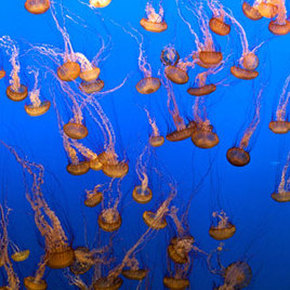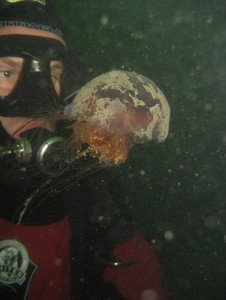Jellyfish Takeover?
Navigation
"In simple terms, jellyfish blooms are growing – and stresses caused by human activity such as overfishing are said to be the most likely cause. Fisheries-based ecosystems are frequently overfished, and taking too many fish out of ecosystems creates ecological space for jellyfish to thrive." ~ Pew Environment Group
"Over recent decades, man's expanding influence on the oceans has begun to cause real change and there is reason to think that in some regions, new blooms of jellyfish are occurring in response to some of the cumulative effects of these impacts. The issue is not simple and in most cases there are few data to support our perceptions." ~ Marine Biologist Claudia Mills

Sea Nettle Jellyfish | Source: Wikipedia Commons
From jellyfish blooms being unfounded
, to pulsing cyclically through time
, to plaguing the world's oceans
, the status of whether or not jellyfish are indeed 'taking over' the world's oceans seems all over the spectrum of yes, no and all the shades in between. However, the weight of evidence seems to have settled closer to yes, although not conclusively nor with great consensus. All over the Earth, fish populations and ocean ecosystems may be facing a new threat of massive blooms of jellyfish taking over the oceans. Human influence on the increase of jellyfish populations has occurred by greatly overfishing jellyfish predators
, such as sharks and tuna, pollution and agricultural fertilizers
making their way to sea, which create algal blooms de-oxygenating the water and allowing jellyfish to thrive, and not taking enough action to combat climate change
which has led to a rise in ocean temperatures
creating ideal conditions for jellyfish blooms, which occurs when populations explode in swarming numbers, causing havoc to shorelines, the balance of ocean ecosystems and even power plants around the world
, including a nuclear power plant in the UK
, and seaside power and desalination plants in Japan, the Middle East and Africa
. The blooms are also dangerous to swimmers. The effects of jellyfish stings
vary across the species from painless to agony and even death. If present climate change
, pollution
and overfishing
trends continue, fishing boats could soon be chasing jellyfish instead of fish. Learn more.
"Mounting evidence suggests that open-ocean ecosystems can flip from being dominated by fish, to being dominated by jellyfish. This would have lasting ecological, economic and social consequences." ~ Dr. Anthony Richardson, CSIRO and University of Queensland scientist
'Jellyfish Joyride' A Threat To The Oceans
Hydrobiologia
: Increasing Jellyfish Populations: Trends in Large Marine Ecosystems
"In the last decade enormous plagues of jellyfish have been taking over the seas. And it is our fault."
~ BBC Future, Jellyfish blooms creating oceans of slime
~ BBC Future, Jellyfish blooms creating oceans of slime
| |
Jellyfish Bloom Publications
The jellyfish joyride: causes, consequences and management responses to a more gelatinous future
richardson_et_al_2009_tree_-_the_jellyfish_joyride.pdf
File Size:
3948 kb
File Type:
pdf
Anthropogenic causes of jellyfish blooms and their direct consequences for humans: a review
purcell2007.pdf
File Size:
899 kb
File Type:
pdf
Algal and Jellyfish Blooms in the Mediterranean and Black Sea: A Brief Review
gfcm_algal_jelly_paper_nastasi.pdf
File Size:
1261 kb
File Type:
pdf
Increasing jellyfish populations: trends in Large Marine Ecosystems
art3a10.10072fs10750-012-1039-71.pdf
File Size:
1318 kb
File Type:
pdf
Overfishing drives a trophic cascade in the Black Sea
m225p053.pdf
File Size:
296 kb
File Type:
pdf
Trophic cascades triggered by overfishing reveal possible mechanisms of ecosystem regime shifts
pnas-2007-daskalov-10518-23.pdf
File Size:
767 kb
File Type:
pdf
Jellyfish blooms in China: Dominant species, causes and consequences
jellyfish_blooms_in_china.pdf
File Size:
891 kb
File Type:
pdf
Have jellyfish in the Irish Sea benefited from climate change and overfishing?
Requires login for PDF
Requires login for PDF
"Jellyfish are increasing in the majority of the world’s coastal ecosystems. In a study published in the edition of the journal Hydrobiologia, UBC scientists examined data for numerous species of jellyfish for 45 of the world’s 66 Large Marine Ecosystems. They found increasing jellyfish populations in 62 percent of the regions analyzed, including East Asia, the Black Sea, the Mediterranean, the Northeast U.S. Shelf, Hawaii, and Antarctica. There has been anecdotal evidence that jellyfish were on the rise in recent decades, but there hasn’t been a global study that gathered together all the existing data until now. Our study confirms these observations scientifically after analysis of available information from 1950 to the present for more than 138 different jellyfish populations around the world." ~ Jellyfish on the rise: UBC study
"Since 2002, the population has exploded — in jelly parlance, bloomed — six times. In 2005, a particularly bad year, the Sea of Japan brimmed with as many as 20 billion of the bobbing bags of blubber, bludgeoning fisheries with 30 billion yen in losses. In recent years, populations of several jellyfish species have made inroads at the expense of their main competitor — fish — in a number of regions, including the Yellow Sea, the Gulf of Mexico, and the Black Sea. Overfishing and deteriorating coastal water quality are chief suspects in the rise of jellies. Global warming may be adding fuel to the fire by making more food available to jellyfish and opening up new habitat. Now, researchers fear, conditions are becoming so bad that some ecosystems could be approaching a tipping point in which jellyfish supplant fish." ~ Richard Stone, Yale Environment 360, Massive Outbreak of Jellyfish Could Spell Trouble for Fisheries
Last Revised: 11/20/13
Commenting Rules
Commenting Rules






